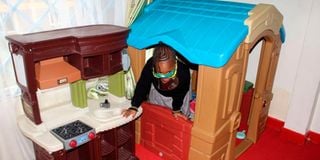Drive to upgrade daycare facilities in city launched

Wanjira Gichuhi from Bees Haven Daycare and kindergarten in Syokimau playing during break time on September 6, 2021.
A non-governmental organisation has launched an initiative to improve the quality of daycare services in informal settlements in Nairobi.
A pilot programme has already proved successful, with 68 daycare centres in Viwandani and Korogocho receiving free training in the last six months.
The African Population and Health Research Centre (APHRC) has also launched a guideline for the running of daycare centres. APHRC’s “Community of Practice Manual” seeks to improve the quality of services in daycare centres and combat malnutrition among children aged three years and below.
APHRC research scientist Margaret Nampijja said the manual will advise county governments on the best practices in running daycare facilities in informal settlements.
“Daycare services are important because they enable women to engage in economic activities while also taking care of their children. This is the reason why our daycare facilities need to be improved,” Dr Nampijja said.
APHRC has also trained community health volunteers, who will supervise the centres to ensure that their services meet the required standards.
Speaking during the launch last week, the Director of Early Childhood Education at the Ministry of Education, Mr Moriasi Gari, said the manual will help prepare the children as they await joining the pre-primary education system.
“Children below the age of four will now get the opportunity to be trained before they join pre-primary one. Through the manual, they will be taught the basic things,” Mr Gari said.
He urged more donors to step in to upscale the project to other counties.
Children in informal settlements face significant challenges to healthy development, particularly when their families need to earn a daily wage and cannot care for them during the day. As a result, informal and poor quality child-care centres with untrained caregivers have proliferated.
Ms Susan Wanjiru, a mother of two who lives in Korogocho, is a trader who deals in second-hand clothes and shoes in the local market.
Being the breadwinner in her family, she has to wake up early and prepare her children before leaving for work.
“My eldest son was brought up in daycare. I brought my second born to Sarafina Daycare when he was only three months old and now he is almost three years. I pay Sh50 per day for the services,” she told Nation. Parents can cook for their children or let them be fed at the facility at a cost of Sh80 per day.
“I’ve operated here for the past eight years. By 5am, I begin receiving children. I’ve always loved taking care of children,” Ms Margaret Wairimu, the Sarafina Daycare manager said .





